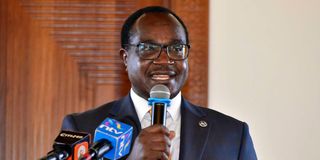CS Ogamba orders public varsities to stop ‘overhiring’ to cut costs

Education Cabinet Secretary Julius Migos Ogamba during the opening ceremony of the National Retreat for Chairpersons of Public Universities Councils in Mombasa on June 13, 2025.
The Cabinet Secretary for Education Julius Ogamba has directed chairpersons of university councils to stop employing excess staff, to reduce the huge wage bill and financial challenges afflicting public institutions of higher learning.
Mr Ogamba acknowledged that the public universities are grappling with complex issues including financial instability, governance challenges, low global competitiveness, and diminishing public trust.
He urged the chairpersons of the councils to make hard decisions including freezing employment and making decisions based on data and evidence and challenged them to adhere to integrity.
The CS said the chairpersons should take the leadership role and rescue the public universities from imminent collapse. He spoke during the national retreat for chairpersons of councils of public universities in Mombasa.
“Don’t be blackmailed. You should not be threatened by someone telling you that you will be removed if you do not do their bidding. Don’t be threatened because someone tells you don’t come from their area, you won’t be the chair of a university and they will bring people to demonstrate at the gate,” said the CS.
Public universities have been facing challenges over the years, including debts amounting to over Sh72 billion. President William Ruto introduced a new funding model for higher education in 2023 but which has failed to cure the ills and now a matter before the Court of Appeal after the High Court earlier declared it unconstitutional.
He urged the chairpersons to use the three-day retreat in Mombasa to discuss, consult and offer solutions to the challenges facing their institutions.
“Give us foundational starting points on how we are going to run this sector. We have 43 universities in the public sector, a good percentage of us are doing well another percentage is not doing too well, let’s learn from each other,” said the CS.
At the same time, Mr Ogamba poured his heart out saying when he was appointed CS almost a year ago, he did not know the extent of the problems and ‘cartels’ within the ministry.
“Education is supposed to be the easiest ministry to run, why? Because these are educated people. With educated people you negotiate, talk about issues, you don’t carry stones around, you don’t carry pangas as you talk,” he said.
“I thought it was supposed to be a very easy place because it is not like, for instance, [Ministry of] Interior. We should be able to move our minds from the mindset of scarcity. Education, ideas, creation and commercialisation of those ideas,” he said.
Mr Ogamba faulted some chairpersons saying that some of the councils in the universities are a major letdown.
“We have in recent years witnessed glaring and appalling cases of ineptitude in some of our universities. Many of these cases are a direct result of financial mismanagement, administrative disorder and human resource decay,” said the CS.
He cited court cases of human resource malpractices, over-employment of staff and in some cases, ethnic discrimination, linked to questionable decision-making by councils.
Some of these leadership gaps, the CS said have oftentimes, compelled the Ministry of Education to step in with painful but necessary interventions to stop the affected universities from falling into a deeper leadership morass. Some of these unfortunate council decisions have also exposed the public to costly litigation.
However, he assured education stakeholders that the Ministry of Education is in the process of enhancing the higher education funding model, addressing its teething challenges, refine the eligibility criteria, and ensure that no deserving Kenyan will be left behind.


